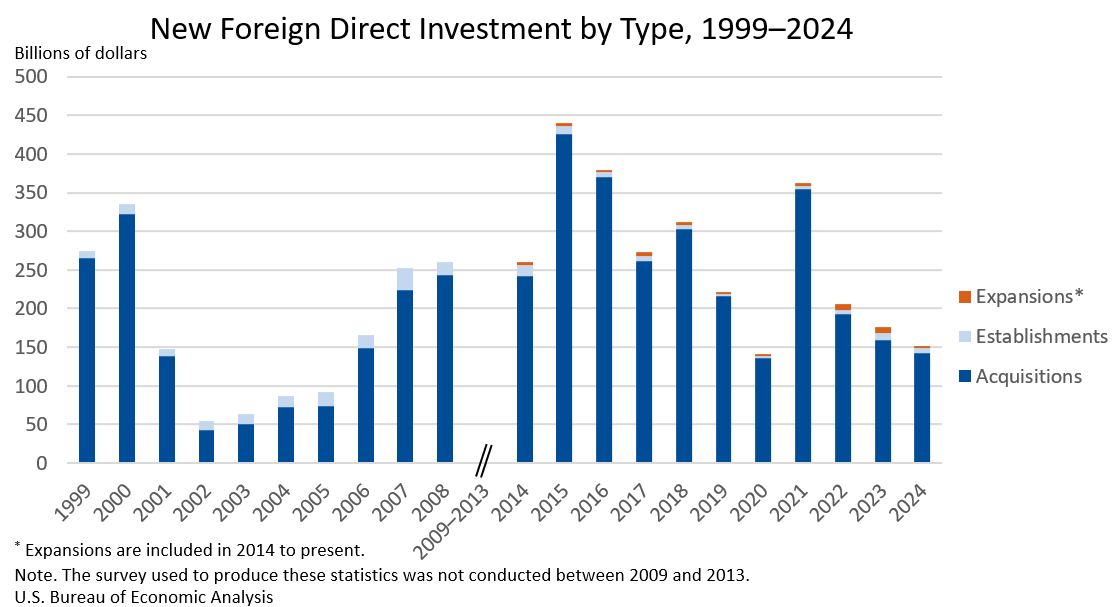Bureau of Economic Analysis
New Foreign Direct Investment in the United States, 2024
Expenditures by foreign direct investors to acquire, establish, or expand U.S. businesses totaled $151.0 billion in 2024, according to preliminary statistics released today by the U.S. Bureau of Economic Analysis. Expenditures decreased $24.9 billion, or 14.2 percent, from $176.0 billion (revised) in 2023 and were below the annual average of $277.2 billion for 2014–2023. As in previous years, acquisitions of existing U.S. businesses accounted for most of the expenditures.
Principal Federal Economic Indicators
Noteworthy
- 2025 News Release Schedule
- Innovation at BEA
- 2025 Annual Updates
- New! Services Trade Data for More Countries
- Data Tool: Trade in Value Added
- Distribution of State Personal Income
- Updated: RIMS II Regional Multipliers
- Arts and Culture
- Space Economy
- FDI Now in State BEARFACTS
- Quick Guide: Price Indexes
The Latest
U.S. International Trade in Goods and Services, July 2022
The U.S. monthly international trade deficit decreased in July 2022 according to the U.S. Bureau of Economic Analysis and the U.S. Census Bureau. The deficit decreased from $80.9 billion in June (revised) to $70.6 billion in July, as exports increased and imports decreased. The previously published June deficit was $79.6 billion. The goods deficit decreased $8.2 billion in July to $91.1 billion. The services surplus increased $2.1 billion in…
Gross Domestic Product for American Samoa, 2021
Real gross domestic product for American Samoa decreased 1.7 percent in 2021 after increasing 5.0 percent in 2020, according to the U.S. Bureau of Economic Analysis. These statistics were developed under the Statistical Improvement Program, funded by the Office of Insular Affairs of the U.S. Department of the Interior.
Gross Domestic Product for American Samoa, 2021
Real gross domestic product (GDP) for American Samoa decreased 1.7 percent in 2021 after increasing 5.0 percent in 2020. The decrease in real GDP reflected decreases in exports and private inventory investment. These decreases were partly offset by increases in personal consumption expenditures, government spending, and private fixed investment.
Personal Income and Outlays, July 2022
Personal income increased $47.0 billion, or 0.2 percent at a monthly rate, while consumer spending increased $23.7 billion, or 0.1 percent, in July. The increase in personal income primarily reflected an increase in compensation. The personal saving rate (that is, personal saving as a percentage of disposable personal income) was 5.0 percent in July, the same rate as in June.
Personal Income and Outlays, July 2022
Personal income increased $47.0 billion, or 0.2 percent at a monthly rate, while consumer spending increased $23.7 billion, or 0.1 percent, in July. The increase in personal income primarily reflected an increase in compensation. The personal saving rate (that is, personal saving as a percentage of disposable personal income) was 5.0 percent in July, the same rate as in June.
Gross Domestic Product (Second Estimate) and Corporate Profits (Preliminary), Second Quarter 2022
Real gross domestic product (GDP) decreased at an annual rate of 0.6 percent in the second quarter of 2022, following a decrease of 1.6 percent in the first quarter. The second-quarter decrease was revised up 0.3 percentage point from the "advance" estimate released in July. The smaller decrease in the second quarter, compared to the first quarter, primarily reflected an upturn in exports and a smaller decrease in federal government…
Gross Domestic Product (Second Estimate) Corporate Profits (Preliminary Estimate) Second Quarter 2022
Real gross domestic product (GDP) decreased at an annual rate of 0.6 percent in the second quarter of 2022, following a decrease of 1.6 percent in the first quarter. The second-quarter decrease was revised up 0.3 percentage point from the “advance” estimate released in July. The smaller decrease in the second quarter, compared to the first quarter, primarily reflected an upturn in exports and a smaller decrease in federal government spending…
Activities of U.S. Affiliates of Foreign Multinational Enterprises, 2020
Majority-owned U.S. affiliates (MOUSAs) of foreign multinational enterprises employed 7.86 million workers in the United States in 2020, a 2.8 percent decrease from 8.08 million workers in 2019, according to the U.S. Bureau of Economic Analysis. MOUSAs accounted for 6.4 percent of total private industry employment in the United States in 2020.
Activities of U.S. Affiliates of Foreign Multinational Enterprises, 2020
Majority-owned U.S. affiliates (MOUSAs) of foreign multinational enterprises employed 7.86 million workers in the United States in 2020, a 2.8 percent decrease from 8.08 million workers in 2019, according to the U.S. Bureau of Economic Analysis. MOUSAs accounted for 6.4 percent of total private-industry employment in the United States in 2020.
June 2022 Trade Gap is $79.6 Billion
The U.S. monthly international trade deficit decreased in June 2022 according to the U.S. Bureau of Economic Analysis and the U.S. Census Bureau. The deficit decreased from $84.9 billion in May (revised) to $79.6 billion in June, as exports increased and imports decreased. The previously published May deficit was $85.5 billion. The goods deficit decreased$4.9 billion in June to $99.5 billion. The services surplus increased $0.3 billion in…




